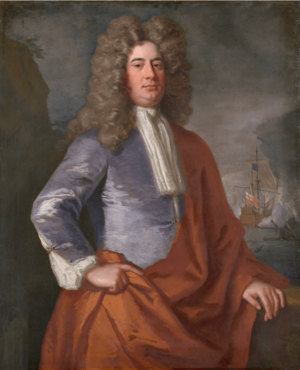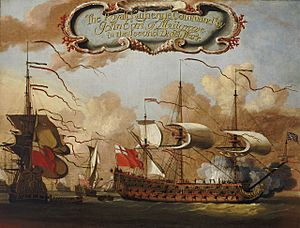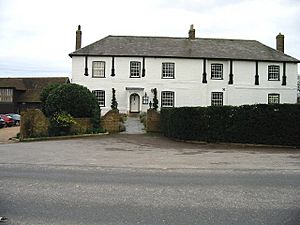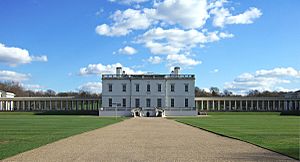Matthew Aylmer, 1st Baron Aylmer facts for kids
Quick facts for kids
The Lord Aylmer
|
|
|---|---|

Attributed to Jonathan Richardson, c.1692 (NMM)
|
|
| Born | ca. 1650 Meath, Ireland |
| Died | 18 August 1720 Queen's House, Greenwich |
| Buried | |
| Allegiance | |
| Service/ |
|
| Years of service | 1678–1699, 1709–1720 |
| Rank | Admiral of the Fleet |
| Commands held | HMS Chatham HMS Date Tree HMS Castle HMS Swann HMS Tiger HMS Charles HMS Swallow HMS Mary HMS Royal Katherine HMS Monck HMS London Greenwich Hospital |
| Battles/wars | Nine Years' War |
| Other work | Ranger of Greenwich Park |
Admiral of the Fleet Matthew Aylmer, 1st Baron Aylmer (around 1650 – 18 August 1720) was an important Anglo-Irish Royal Navy officer. He also served as a politician in the English and British House of Commons. He was known for his support of Prince William of Orange during the Glorious Revolution in 1688.
Aylmer fought in several major naval battles during the Nine Years' War. Later, he became the Commander-in-Chief of the Navy. He also became the Governor of Greenwich Hospital. In this role, he helped create the Royal Hospital School for the sons of sailors.
Contents
Matthew Aylmer was born in County Meath, Ireland. He was the second son of Sir Christopher Aylmer. Matthew first served briefly in the Army in 1672. Then, he joined the Royal Navy in October 1677 as a midshipman.
He quickly rose through the ranks. He became a lieutenant in April 1678 and a commander in January 1679. He commanded several ships, including the sloop HMS Chatham. He also commanded the fire ship HMS Castle in the Mediterranean Fleet.
Supporting the Glorious Revolution
In October 1688, Aylmer became a captain. He was given command of HMS Swallow. At this time, Prince William of Orange landed in England. Aylmer was one of the captains who wrote a letter to Prince William. They promised their support to the Prince.
Aylmer even visited Prince William's headquarters. He helped arrange for the Royal Navy to switch its loyalty to the Prince. This event was a key part of the Glorious Revolution in November 1688.
Fighting in Major Battles
After the revolution, Aylmer continued to serve in the Navy. In December 1688, he commanded HMS Mary. He was present at the Battle of Bantry Bay in May 1689. This was an early battle in the Nine Years' War. Sadly, his brother George was killed during this battle.
In 1690, Aylmer commanded HMS Royal Katherine. He fought at the Battle of Beachy Head in July 1690. Later, in 1692, he commanded HMS London. He saw action at the Battle of Barfleur in May 1692.
Rising to Senior Command
Aylmer continued to be promoted in the Navy. He became a rear admiral in February 1693. In June 1693, he was promoted to vice admiral. He served as second-in-command of the Mediterranean Fleet.
He also became involved in politics. He was elected as a Member of Parliament for Portsmouth in 1695. Later, he was elected for Dover in 1697. The Treaty of Ryswick ended the Nine Years' War in 1697. Aylmer then retired from active service in October 1699. He bought a home called Wallett's Court Manor in Westcliffe.
Commander-in-Chief and Greenwich Hospital
In November 1709, Aylmer was promoted to Admiral of the Fleet. He became the Commander-in-Chief of the Navy. However, he lost his political seat in 1710. In July 1710, he met a French squadron. He only captured one merchant ship and one warship. This was seen as a failure, and he was removed from his command in January 1711.
When George I became king in 1714, Aylmer was reappointed Commander-in-Chief. This happened in November 1714. On the same day, he was also made Governor of Greenwich Hospital. This was a very important role. As Governor, he started funding education for the sons of sailors. He used money from entry charges to the Painted Hall and other sources. This led to the founding of the Royal Hospital School. He was also appointed Ranger of Greenwich Park.
Aylmer got his Parliament seat back for Dover in 1715. He continued to serve in important naval roles. In May 1718, he was made Lord Aylmer of Balrath. This was a special title in the Peerage of Ireland.
Matthew Aylmer died at Queen's House in Greenwich on 18 August 1720. He was buried at St Alfege's Church in Greenwich.
Family Life
Around 1680, Matthew Aylmer married Sarah Ellis. They had one son and two daughters together.
 | Ernest Everett Just |
 | Mary Jackson |
 | Emmett Chappelle |
 | Marie Maynard Daly |




